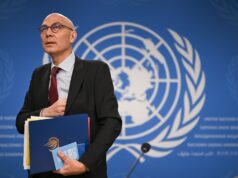The Editorial of Namathu Eelanadu Monthly – June 2023
The 53rd Session of the United Nations Human Rights Council is scheduled to commence on July 19th and conclude on July 14th. During this session, on Wednesday the 21st, at 3 pm Geneva time (6.30 pm Sri Lanka time), High Commissioner for Human Rights, Volker Derk, presented an oral report on the human rights situation in Sri Lanka.

This report assessed the progress made in terms of reconciliation, accountability, economic crisis, and corruption scandals, as outlined in Resolution 51(1) titled ‘Promoting Reconciliation, Accountability and Human Rights in Sri Lanka’. While concerns were voiced by member states, it is unlikely that any new resolutions will be passed on Sri Lanka.
The composition of the Sri Lankan delegation has changed since the last session, with Himali Arunathilaka, the Permanent Resident Representative of Sri Lanka in Geneva, leading the current delegation. These developments suggest that Sri Lanka is not giving due attention to this issue.
Furthermore, it appears that Western countries, including the United States, will not take significant measures against the present government led by Ranil. As usual, various political leaders, affected parties, and diaspora organizations will likely attend side events, representing the affected side.
Regrettably, it is unlikely that substantial progress will be made beyond these actions, not only in this session but also in the foreseeable future. This essay explores the reasons behind this stagnation and its potential consequences.
The absence of new resolutions against Sri Lanka indicates a reluctance among member states to exert strong pressure on the country. Despite concerns being expressed, no concrete measures are expected to be taken. The international community’s hesitance to address the ongoing issues highlights the limited effectiveness of the United Nations Human Rights Council in enforcing change.
During the last session, a delegation led by Minister of Foreign Affairs Ali Sabri and Minister of Justice Vijayadasa Rajapaksa represented Sri Lanka. However, the current delegation is led by the Permanent Resident Representative of Sri Lanka in Geneva, Himali Arunathilaka. This shift in representation suggests a lack of priority given to the matter by the Sri Lankan government. It also implies that the government led by Ranil is unlikely to face significant consequences for its actions.
Considering the current political landscape, it is highly probable that the Ranil-led government will maintain its position of power. Even if a change in leadership were to occur, the new government would likely align itself with America, India, and Western nations. This underscores the dominance of global politics exerted by these powerful players. Consequently, the Geneva Conference serves merely as a forum for affected parties seeking justice, with little hope for substantial resolution.
The persistence of this situation is likely to lead to an impasse, rendering the dilution of matters even more challenging. Victims and those seeking justice may face frustration and a sense of hopelessness as their concerns go unresolved. Without substantial action and accountability, the pursuit of reconciliation and human rights in Sri Lanka will remain stagnant, perpetuating a cycle of injustice and suffering.
The 53rd Session of the United Nations Human Rights Council in Geneva presents a disheartening picture regarding victim relations in Sri Lanka. The lack of international pressure, political dynamics, and the foreseeable future dominated by similar circumstances contribute to the perpetuation of a dire situation.
The Geneva Conference, although providing a platform for affected parties to voice their concerns, is unlikely to yield significant outcomes beyond this symbolism. As a result, a troubling impasse may ensue, prolonging the suffering and hindering progress towards reconciliation and human rights in Sri Lanka.





